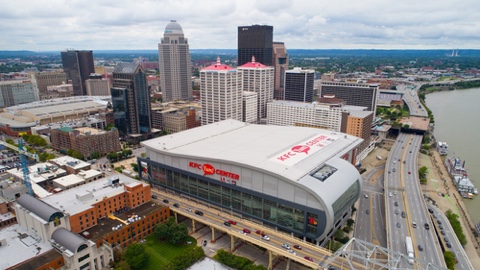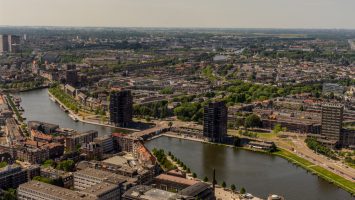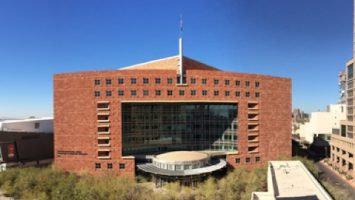
Known for the Derby and the Cardinals, and home to six Fortune 500 companies, Louisville has been a cultural and economic outpost since 1778. It is one of the longest established cities west of the Appalachia Mountains, but there’s nothing old about it’s vision for the future. Grace Simrall speaks with us about civic innovation and smart cities growth in the “Gateway to the South”:
Q: You are the Chief of Civic Innovation and Technology for Louisville. Can you tell me how that role has evolved, if at all, with the emergence of the ‘smart cities’ umbrella? How do you estimate it will continue to change in the future?
A: Mayor Greg Fischer created the role to focus on breakthrough innovations and he delegated the authority to articulate the vision, strategy, and implementation of these breakthroughs. When I joined his administration in August 2016, I focused on defining Louisville’s competitive advantage as it relates to civic innovation and the smart cities’ umbrella. Through that work, we were able to add smart cities to the Mayor’s Strategic Plan during it’s most recent refresh with defined smart goals for how to achieve it. As the technology available in the private sector matures, the strategic plan will continue to evolve with it.
Q: Tell me about your smart city vision for Louisville, in particular, and how you think technology could enhance the lives of residents and visitors there.
A: Our goal in pursuing a smart city initiative has everything to do with transforming service delivery to our residents and the outcomes experienced by our city. The smart city needs a solid foundation – infrastructure that includes wireline and wireless connectivity, computing and data storage. Building on the infrastructure is technology and data that drives resident services. In addition, we recognize that the city needs to build public-private partnerships and to ensure that all policies and solutions are examined through an equity lens.
Q: Of which current or previous smart project are you most proud? What makes it stand out to you?
A: We recently launched the Open Government Coalition to reduce the barriers for cities to implement novel sources of data. Our first project takes data from the Waze Connected Citizens Platform (a program free to cities) and lays out step by step instructions for implementation of a cloud solution to transform how traffic engineers do their daily work. Over 90 cities globally have expressed interest in implementing the solution and the Chief Innovation Officer of Anchorage, Alaska, was able to do so on a laptop during a flight! Minor traffic studies can be validated using the tool, and it serves as an early warning indicator when traffic lights go out or there is an accident.
Q: What is the greatest obstacle that Louisville (and perhaps other cities) face in adopting smarter systems and technologies? What barrier, if removed, would make the most significant difference?
A: There are a number of obstacles. Perhaps the most significant barrier is sustainable funding. Many cities are able to fund pilot projects, but when it is time to implement the project at scale, they are unable to fund the project. Another significant barrier is that the various technologies are siloed and not cyber hardened. It will be difficult for cities to manage the technologies without a unified view and the risk of cyber attack should give cities pause before transferring vital services. Finally, equity remains a challenge in Louisville and other cities. We will only be as “smart” as the least connected portion of our city and it is our responsibility to make choices that advance digital inclusion for all.
Q: Louisville made it to the final nine for the Smart Cities Council Readiness Challenge, applied to the DOT Smart Cities Challenge, and has a mayor who speaks to the goal of a smarter community publicly. The city isn’t shy! What would you like for the Louisville to be most known for in the smart community?
A: While plans are important, we are a city that gets real breakthrough projects done. We are the first city to partner with IFTTT to democratize open data. We pioneered the Open Government Coalition to make the Waze Connected Citizen Platform data actionable. We are in the middle of a major municipal fiber network build out (increasing our fiber footprint by 500%) and launched a digital inclusion plan to increase equitable access of home internet while providing hardware and skills to take full advantage of it. Our co-creation with the citizen scientist and maker community resulted in the development of a wireless smoke detector to improve the ability to respond to fires in blighted properties (keeping the residents in occupied homes nearby safe). We submitted a proposal to the Bloomberg Philanthropies Mayors Challenge to respond to detected gunshots using drones as aerial cameras in seconds rather than minutes, netting us a Champion City designation. Working in partnership with the American Printing House for the Blind, we’ve used Bluetooth Beacons and OpenStreetMaps to transform public spaces: Louisville International Airport is now the first fully accessible airport for travelers who are blind or visually impaired. These are just some of the projects we’ve worked on this the start of my tenure and represent the breadth of breakthroughs started by Louisville.
Learn more about the work in Louisville from Grace Simrall in person at Smart Cities Connect Conference and Expo this fall in Tampa.


